

Parliament seizes cache of Facebook internal papers. Parliament has used its legal powers to seize internal Facebook documents in an extraordinary attempt to hold the US social media giant to account after chief executive Mark Zuckerberg repeatedly refused to answer MPs’ questions.

The cache of documents is alleged to contain significant revelations about Facebook decisions on data and privacy controls that led to the Cambridge Analytica scandal. It is claimed they include confidential emails between senior executives, and correspondence with Zuckerberg. Damian Collins, the chair of the culture, media and sport select committee, invoked a rare parliamentary mechanism to compel the founder of a US software company, Six4Three, to hand over the documents during a business trip to London. In another exceptional move, parliament sent a serjeant at arms to his hotel with a final warning and a two-hour deadline to comply with its order. Facebook appeals against Cambridge Analytica fine.
Image copyright Getty Images Facebook has appealed against a fine imposed on it by the UK's data watchdog after the Cambridge Analytica scandal.

The social network says that because the regulator found no evidence that UK users' personal data had been shared inappropriately, the £500,000 penalty was unjustified. Last month, the watchdog said Facebook's failure to make suitable checks on apps and developers amounted to a "serious breach of the law". It has acknowledged the appeal. Your Data, Your Rights - survey results — Corsham Institute. We asked people how comfortable they felt about automated decision-making by financial organisations.
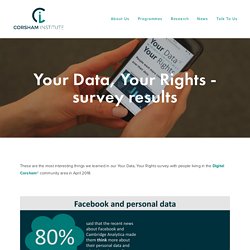
Companies often use algorithms to combine a range of information about individuals to make decisions about certain issues automatically. 63% of our respondents weren’t aware that they could ask organisations to review decisions made by automated systems. Our survey also highlighted some interesting demographic variations. 87% of over 65s care ‘a lot’ about the use of their personal data (compared to 60% overall who care ‘a lot’) and were the most likely to use their new data rights: 80% of over 65s were ‘very likely’ to use their right to rectification (compared to 64% overall); 67% of over 65s were ‘very likely’ to use their right to erasure (compared to 38% overall).
High-court-sets-out-11-questions-for-ecj-on-eu-us-data-transfers-1. Legal uncertainty surrounds the capacity of companies such as Facebook to transfer European users’ data to the US after a High Court judge asked the most senior EU court to consider 11 questions on the issue.
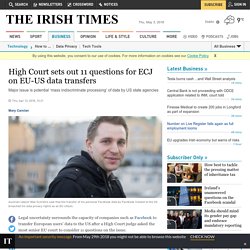
The referral stems from a case taken by Austrian privacy activist Max Schrems. The questions raise significant issues of EU law with huge implications, including whether the High Court has correctly found there is “mass indiscriminate processing” of data by US government agencies under the PRISM and Upstream programmes authorised there. The questions also ask whether EU law applies to the processing of personal data for national security purposes regardless of whether that data processing takes place in the EU or US or other third country. Investigation into the use of data analytics in political campaigns 20181107.
FB Cambridge Analytica. Information Commissioner spends £1.4m on Facebook and Cambridge Analytica investigation. Investigation into data analytics for political purposes update. ICO serves Enforcement Notice on SCL Elections Ltd over inadequate response to subject access request. The Information Commissioner’s Office (ICO) has served a legal notice on SCL Elections Ltd ordering it give an academic all the personal information the company holds about him.
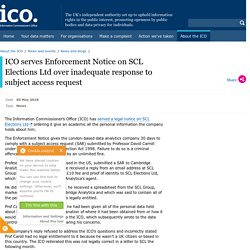
The Enforcement Notice gives the London-based data analytics company 30 days to comply with a subject access request (SAR) submitted by Professor David Carroll under the terms of the Data Protection Act 1998. Failure to do so is a criminal offence, punishable in the courts by an unlimited fine. Findings, recommendations and actions from ICO investigation into data analytics in political campaigns.
Information Commissioner Elizabeth Denham has today published a detailed update of her office’s investigation into the use of data analytics in political campaigns.
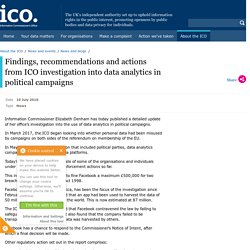
In March 2017, the ICO began looking into whether personal data had been misused by campaigns on both sides of the referendum on membership of the EU. In May it launched an investigation that included political parties, data analytics companies and major social media platforms. First UK enforcement action under GDPR and the new Data. Those who have been waiting, since 25 May this year, for the first formal enforcement action issued under the General Data Protection Regulation (GDPR) and the Data Protection Act 2018 (DPA18), might just have missed - as I did - that it actually surfaced in July, but with such little fanfare that it went largely unnoticed.
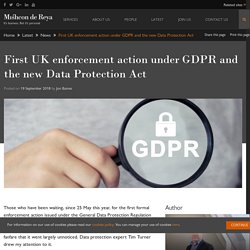
Data protection expert Tim Turner drew my attention to it. The action in question was an Enforcement Notice of the Information Commissioner, served under section 149 of DPA18, on AggregateIQ Data Services Ltd ("AIQ") requiring it to 'cease processing any personal data of UK or EU citizens obtained from UK political organisations or otherwise for the purposes of data analytics, political campaigning or any other advertising purposes' One could be forgiven, however, for overlooking the Notice. It is not, for some reason, listed on the Commissioner's "Enforcement action" page (which is stated to include "the latest…enforcement notices"). UK issues first-ever GDPR notice in connection to Facebook data scandal. This device is unable to play the requested video.
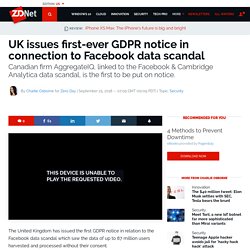
The United Kingdom has issued the first GDPR notice in relation to the Facebook data scandal which saw the data of up to 87 million users harvested and processed without their consent. While the UK's Information Commissioner's Office (ICO) has recently imposed the maximum fine of £500,000 under the terms of the Data Protection Act 1998 on Facebook for the social media giant's role in the scandal, a Canadian company may not be so lucky in avoiding scrutiny under new data protection laws. The EU's General Data Protection Regulation (GDPR) came into force this year, on May 25. Under the terms of the legislation, companies operating in the region must report data breaches to regulators within 72 hours.